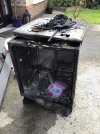For those of you running appliances by night, why don't you look to install solar panels and run your appliances from "free" energy, during the daytime, instead?
Snap! When I mentioned this thread to the missus she quoted me a headline that she had recently read somewhere.
It's along the lines that "the Irish are the only people who spend thousands of euros to save a few cents"!
